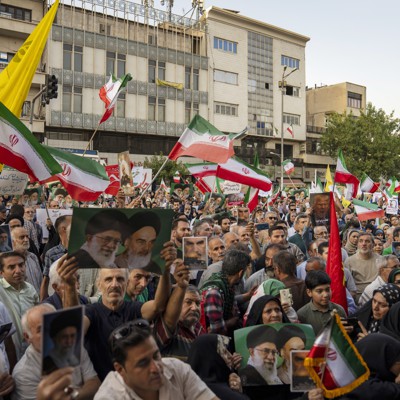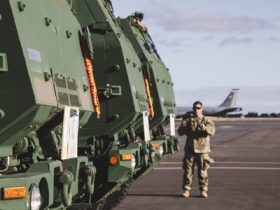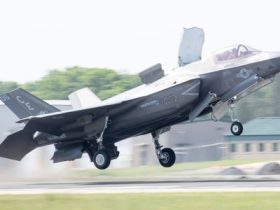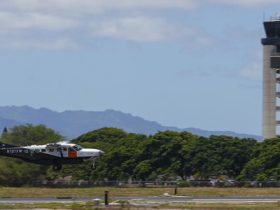A ceasefire between Israel and Iran appears to be holding, bringing a temporary halt to fighting that many feared would spiral into a regional war. The next challenge is to renew diplomacy amid the region’s new security landscape—and once again, seek a deal to stop Tehran from pursuing nuclear weapons.
As the dust settles, it is clear that Iran’s nuclear and conventional warfare capacities have been severely degraded. Key elements of its military infrastructure were destroyed. Its deterrent posture—built on missile arsenals, proxy networks, and the threat of retaliation—has been weakened. And its reputation as a dominant regional actor is under strain, particularly in the eyes of Gulf states that once viewed Tehran as an unchallengeable threat.
Iran’s power has been curtailed. The threat it poses to its neighbors, especially across the Gulf, has receded, but not disappeared. Whether this marks the beginning of a longer-term decline in Iran’s regional influence, or merely a pause before recalibration, remains to be seen.
The past two years of Israel-Iran conflict, culminating in the 12-day war, substantially weakened Iran’s regional network. Tehran lost its foothold in Syria after the fall of the Assad regime. In Lebanon, Hezbollah’s political and military capital has been eroded. Yet Iran retains key assets: it maintains deep influence in Iraq through entrenched Shi’a militias; it holds sway in Yemen and the Gulf of Aden via the Houthis; and it still has formal and informal ties with several Gulf states. While its capacity to project power has narrowed, its regional web remains intact.
China’s response—or lack thereof—was also telling. Despite its strategic partnership with Iran, Beijing did not intervene, nor did it shield Iran diplomatically, economically, or militarily in any way that altered the course of the war. The silence from China underscored an uncomfortable reality for Tehran: it has few friends willing to tolerate its continued destabilization of the region.
For Israel, this outcome may feel like a strategic success. Iran’s near-term nuclear threat appears to have been neutralized. Tel Aviv, likely reassured that nuclear breakout is no longer imminent, will almost certainly explore options—overt and covert—to prevent Iran from reconstituting its program. Those efforts, if miscalculated, could provoke a response and reignite the conflict.
It remains to be seen whether Israeli leaders will be satisfied with containment or will seek to further exploit Iran’s weakened state. Despite its losses, Iran still holds a sizable arsenal of missiles and drones. It’s too early to conclude that this war deterred its nuclear ambitions—and in all likelihood, it didn’t. What the conflict may have done is delay those ambitions, degrade key infrastructure, and expose vulnerabilities. But the need for negotiations remains. If anything, the current moment makes a return to talks more urgent—not just to address nuclear issues but to establish guardrails before another round of escalation begins.
Meanwhile, the region remains littered with potential flashpoints. Iran still commands active proxy networks. Any one of these arenas could serve as a pressure valve for Tehran—or a trigger point for renewed escalation.
The ceasefire offers a temporary reprieve, not a resolution. If it holds, this will mark a transition to a new phase of regional recalibration. Direct U.S.–Iran engagement is a substantial development. Trump, breaking with his predecessors, opted to deal with Tehran directly, albeit also using military force as both stick and leverage. That decision has opened a small but significant door to diplomacy. The challenge now is whether that door can be kept open long enough to stabilize the post-war environment.
A renewed nuclear agreement should be the starting point. Without a verified cap on Iran’s nuclear program, the conditions that led to this war are likely to resurface. But the end goal cannot only be arms control and non-proliferation. There must be a broader diplomatic effort to shift Iran’s role and behavior in the region. That will be neither easy nor fast.
Arab states will be essential to this effort. They remain the most exposed to the fallout of Israel–Iran escalation and the most invested in finding off-ramps. The efforts started before the conflict. Saudi Arabia took early steps with normalization talks in 2023 and have since maintained a bilateral dialogue platform, guaranteed by the Chinese. The UAE and Qatar also maintain pragmatic ties with Tehran. These relationships can serve as pressure valves, channels for dialogue, and as potential guarantors of any future arrangement.
But a deeper obstacle remains. Iran continues to use non-state actors as a central feature of its regional foreign policy, and it relies on keeping Middle East states fragile and unstable. So long as Tehran funds and arms militias in fragile states, the international community will not support any substantial economic package or deal. Critics of the JCPOA highlighted this as the critical flaw in the initial framework. Namely, that Tehran mobilized millions of dollars in sanctions relief to bolster the capabilities of non-state actors through the Iranian Revolutionary Guard Corp. Iran’s track record in Syria, Iraq, Lebanon, and Yemen has cemented its image as a destabilizing force, and the international community will want to see Iranian behavior constrained well beyond the nuclear file.
Any future agreement must account for that reality. Verification will be critical—not just for nuclear compliance, but for broader behavioral commitments. Regional actors, in additional to the international community, will need a seat at the table. They are the ones who bear the consequences when deals are broken, and they will be the ones who either reinforce or reject a new order.
Whether this moment becomes a turning point, or a prelude depends on what comes next. Talks must resume. Red lines must be clarified. And all sides must begin building something more durable than battlefield deterrence. Without that, the calm will remain temporary—and the next conflict, only a matter of time.
Jesse Marks is the CEO of Rihla Research & Advisory LLC, a DC-based consultancy focused on the Middle East and Asia.
Read the full article here








Leave a Reply